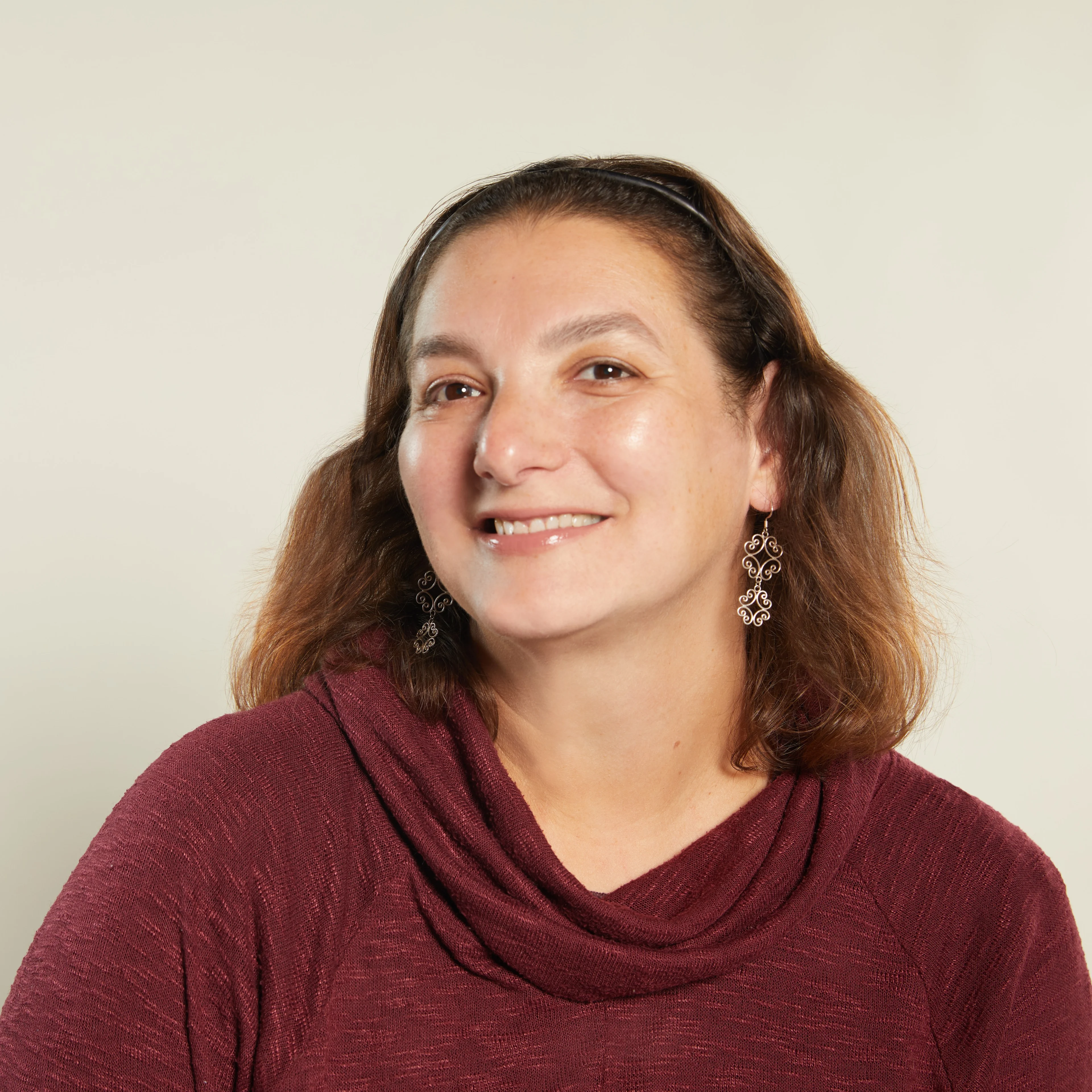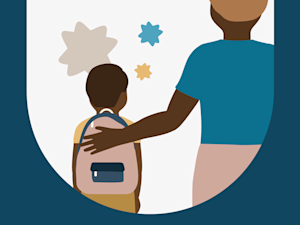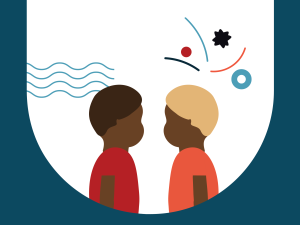Stay in the know
All our latest podcasts delivered right to your inbox.
What’s it like to be a dad who’s “in it”?
In this episode, hosts Amanda Morin and Bob Cunningham take a moment to hear from and celebrate dads of kids who learn and think differently. Find out how some dads are treated differently than moms (and by moms). Some feel like they get “extra credit” just for showing up. Another got in trouble at work for taking time to be with their kids.
We also hear from Khalil, a dad with dyslexia, on how he’s parenting differently than his father did.
Listen in. Then read a personal take from a dad who “feels invisible at” IEP meetings.
Subscribe to In It on iTunes, Spotify, Stitcher, or wherever you listen to podcasts.
Episode transcript
Amanda: Hi. I'm Amanda Morin. I'm a writer for Understood.org, a parent of kids who learn differently, and a former teacher.
Bob: And I'm Bob Cunningham. I'm a career educator and parent, as well as executive director for learning development at Understood.
Amanda: And we are "In It."
Bob: This is a podcast from Understood. On this show, we'll hear from parents and caregivers and sometimes even kids. And we'll offer support and advice for families whose kids are struggling with reading, math, focus, and other learning and thinking differences.
Amanda: Today, we're talking to and about dads who are in it.
Amanda: So, Bob, between us, we've been calling this episode "Where Are All the Dads?" Which maybe sounds a little judgy. At least, I think that's how some dads heard it when we put the question out there.
Caller 1: I wonder, sometimes, if people think that dads don't do anything? Because I do think we do a lot. But maybe it's for other aspects that aren't as school-related, you know, sports and building up their confidence and wrestling, I don't know. Maybe those are so stereotypically guy things, but they're things I do with both my daughter and my son, and I think they're really valuable. So, I guess I would say where are all the dads? We're here. We just might not be as visible as moms.
Bob: I hear what he's saying. So, Amanda, let's say right from the start that we know there are lots of different ways folks participate in raising their kids.
Amanda: Yeah. And we also want to say that we know there are plenty of families that don't have dads, like families with single moms or families who have two moms. But today, we're focusing on dads.
Bob: And that's really because, here at Understood, we hear from moms way more than we hear from dads. And we want to look at why. What are the barriers to entry for dads when it comes to raising kids who learn and think differently? And for those dads who get over the barriers, how's it going for them?
Amanda: So for this episode, we're going to hear from you dads, and give you a chance to hear from each other.
Caller 2: I am a dad who's very involved. But what I find frustrating sometimes is being heard or considered as a dad. I remember one IEP meeting where we all sat down and right off the bat a team member turned to my wife and she said, "So, Mom, how do you feel things are going?" Well, I spoke up and I said, I have something to add here. When I picked up my son at the bus stop the other day, he said, "Hey, guess what, Daddy? I didn't even have to get talked to about my bad behavior today. Isn't that good?"
And at that moment, it's like every head at the table snapped right around to me, like they were just noticing I was there for the first time. And I found it very funny at the moment. But it made me realize that it's like no one had expected me to speak up or have information because I was Dad.
Charles: You know, it is so rewarding. It's also so hard. You know, I've been flying by the seat of my pants mostly.
Bob: That is Charles. And over the last few years, Charles has definitely been in it.
Amanda: Charles lives in Los Angeles with his wife, Deanna, and their 9-year-old son, Ryan. For the past few years, Charles has been homeschooling Ryan, who has some processing issues.
Charles: Sensory processing, tactile processing, vision processing, auditory processing...
Amanda: The kinds of issues that can make it really hard to focus in your average busy classroom.
Bob: Charles had never expected to be a stay-at-home homeschooling dad. It all started about four years ago, after he was laid off from his job in IT.
Charles: Now, the job market at that point was horrible. But then it started being, well, I'm only going to look for the best job possible, because every day the teachers were wanting to have conferences after school, wanting to talk. And my wife, who is a lawyer, has a great retirement package. So we couldn't get rid of that. So I stepped up and took care of it.
Amanda: Tell me a little bit about Ryan. What's he like? What's he into?
Charles: OK, well Ryan started off loving to learn. I mean, when he was 18 months old, I could easily have told you his favorite pastimes were having me or Mom or the neighbor read to him. Then he taught himself to read at 3, and then he got kind of damaged by school.
Every day, he was made to feel bad, like I'm a bad kid. And it was clearly not the case. I mean, he's Norm from "Cheers." Yeah, he walks down the hall. Hey, Ryan, stop it. But right now, he's not really enjoying learning. You know, if I say oh, school time, you know, he's going to find five ways to get out of it.
Charles: That's why I've been working since I pulled him out of school to start rebuilding that love of learning.
Bob: During the week, Charles and Ryan spend part of each day working on lessons or playing video games.
Charles: Well, it's fun getting a doctoral-level dissertation on Minecraft from a 9-year-old.
Bob: But they also venture out into the world. Ryan has therapy sessions and goes to classes for kids who learn and think differently. And in those types of spaces, dads tend to be few and far between.
Amanda: So you walk into that room of 30 kids and they are accompanied by 30... moms? Dads?
Charles: I would say 28, 29 moms and one dad or maybe two. So I gotta say, I was surprised. We had three dads last Friday when I was taking them to his Inventioneers class.
Amanda: And did you speak with those other dads about what it's like to be three dads and 27 moms?
Charles: I don't know if I phrased it exactly like that, but I did go over and say, what brings you here? And a lot of times they are like looking for their wives over their shoulder. Like, oh, I'm going to be asked some questions that I may not completely understand. It's like they kind of know, but they're not confident about it.
Amanda: And I'm wondering, what about moms, how they tend to respond to your role as sort of this primary care parent?
Charles: You know, I think they're mostly OK with it, like impressed, maybe? You know, it's like when I walked into the room, sometimes I feel like, oh, there's an interloper. But, you know, I think they get it now that that's what's going on.
Bob: Amanda, we heard from lots of dads for this episode, and one thing that became really clear is that there are some very contradictory messages out there when it comes to dads taking the lead for their kids.
Amanda: Right. On the one hand, there are folks like Charles or the dad we heard from earlier who do put themselves out there. But then they feel dismissed by others like teachers or therapists or moms. And then we also heard from dads who admit that they often get kudos and admiration just for showing up.
Bob: Right. Like John. He says his kids' teachers always seem really appreciative that both he and his wife come to the afterschool meetings.
John: But I think there definitely is an extra-credit feel for my being there. And it's because I'm a dad.
Amanda: Yep. And meanwhile, I don't think us moms are getting any medals for showing up to a parent-teacher conference.
Bob: Then there's the mixed messages dads get at the workplace. We know from research that when men become parents, they'll often see their salaries go up. While for women, if they become parents, the opposite tends to happen.
Amanda: Right. And yet working dads do sometimes run into trouble if they seem to be putting their family ahead of their work.
Bob: And that's what we heard from Jeremy.
Jeremy: I was working at a different organization while my son was in public school in kindergarten, and I had attended probably the fifth IEP meeting. And after finishing that meeting, I went back to the office to go back to work. And my boss sat me down and he said, you know, you spend a lot of time out of the office. And I said, well, I was attending this meeting for my son, for his school. And he said, well, that's something your wife can do. You don't need to be doing that. You should be spending more time at work. And I was just aghast, like "are you serious?" That was actually my last day at that organization. I quit.
And I then over a period of a couple of months looked for a new job, found a new position that would allow me the flexibility that I needed to ensure that I could be there for my family. I wouldn't necessarily want to repeat that period of time when I was looking for something. But I'm actually grateful to my son for that, for giving me the opportunity to find a job that would allow me to be there for him, for my wife, for all of my kids.
Bob: Amanda, I think part of the challenge for dads is that, well, let's face it, for the most part, our society doesn't really place a lot of value on dads spending time with their kids. Except, of course, around stereotypical things like sports or tech activities. But there is a dad we know who's trying to change that.
Amanda: That's right. Three years ago, Brent Johnstone started an organization called FathersRead365 along with another dad, Akeiff Staples. The organization hosts story hours, gives out free books, and provides trainings, all to encourage fathers to read with their young kids every day. And the cool thing is the roots of this project go way back. Brent is dyslexic and reading was a real struggle for him growing up. But he had this dream that as a father, someday he'd sit and read aloud with his kids.
Bob: So even after Brent started this project, he then went and did some research and he found out that this simple act of a dad reading with his kid can have such a huge impact.
Brent: Once you start seeing the statistics on when fathers read with children, the statistics are mind-blowing because they show that if a father engages with their children in early literacy, there's like a 90 percent chance of positive outcomes in a child's life. It leads in kids being less likely to try, drugs, less likely to go to prison. Really, everything that you want to see for your child.
Amanda: With FathersRead365, Brent and Akeiff are pushing to change the way we think about fatherhood.
Brent: You talk to men. They can't wait to throw the ball with their son. They're literally like "Oh yeah, what kid ever wants to place sports with Mom?" So many women literally think about having that moment with their child. You never hear a man say, you know, I can't wait to read with my kid. I can't wait to expose him to all these new experiences by sitting around and reading to him while he's in the womb, reading to him when he's 2, 3, 4 years old. I'm learning what his likes are and reading those things to him.
So we say, you know, we can get these dads involved. It's something that could be done even if you're not there. You know, let me just read this book to him over the phone or FaceTime, something like that. You know, so, it was so important for us to get the fathers involved because we just saw one dad at work, and it's just a great way for men to engage with their children.
Bob: OK. We're going to go back to Charles and Ryan in just a minute. But first, let's bring in one more voice, Khalil Munir.
Amanda: Khalil has dyslexia, which is sort of how our paths crossed. He wasn't diagnosed until he was 14, and he's written for Understood about that, and also about how growing up, his trouble with reading forced him to develop other skills that made him who he is today. He's a performing artist, a teacher, and a children's book author.
Bob: Khalil's also a dad. He's got a 4-year-old son.
Khalil: Corey Day Munir. The love of my life.
Amanda: Being involved in Corey's development, every part of it, is a huge priority for Khalil. Parent-teacher conferences, doctor's appointments, even school field trips.
Khalil: For instance, they went to Legoland the other day, and I couldn't go, and I cried because I want to experience everything that he goes through.
Bob: Khalil's father wasn't around very much when he was a kid.
Khalil: My father was in and out of prison throughout my entire life up until 19. So my relationship to my father would be seeing him in passing in the streets or whenever he was incarcerated, we would go visit.
Amanda: Khalil doesn't want to miss out on Corey's childhood the way his dad missed out on his. So while he can't be there for everything, he's going to be there for a lot.
Khalil: We are mirrors for our children. And a father may not think their child is watching, but they're always watching. And even at 4, they'll remember how involved Dad was or how involved Mom was.
Amanda: If tomorrow somebody said to you, "OK, you can go back to work full time," what would you do?
Charles: I mean, I'd be happy, but I'd definitely be a little sad. My dad worked lots of long hours, and so I didn't get to know him as well as I would have liked. But I mean, me and my son, we know each other. We know how to get on each other's nerves. But we also know how to give each other a big hug, and, you know, really treat each other right, too.
Amanda: But since this is a dads episode, I feel like I really want to hear from you. Can you relate to any of this?
Bob: Yeah, I mean, I was.... My wife has always worked, but sometimes she's worked part time and she's done jobs that have been more flexible. Things like that. So she got to stay home a lot. And that's something that I really missed when they were little.
And when I could make it to their activities and the things they did after school and even some of their performances and stuff in school, it was awesome. But you kind of felt a little like a fish out of water because it was me and maybe one or two other guys and everyone else there was moms.
Amanda: Do you get the feeling that people give you like extra credit for being there?
Bob: Definitely. I think you definitely get people's attention when any dad is there at those activities.
Amanda: I feel like that's insulting to you as a dad.
Bob: A little bit. Yeah. I think you actually have to kind of consciously fight against that idea that dads don't want to be there or dads aren't making enough effort to get there. I'm sure there are some who don't and some who aren't. But I think for the most part, at least, the dads that I interact with would love to be at their kids' events or love to be at all the meetings with their teachers and things like that at school.
Amanda: For those dads, Bob, the ones that you're talking about who really want to go to meetings, I think it's really important for us to point out that they can now use family medical leave to go to things like IEP meetings and doctor's appointments, and that's a victory. So I would suggest if you have the opportunity and you have that available to you to go and talk to your human resources department and say, I want to start doing this, how can I make that work with family medical leave?
Amanda: You've been listening to "In It," a podcast from Understood. Our website is Understood.org, where you can find all sorts of free resources for people raising kids who learn and think differently.
Bob: Our show is produced by Julie Subrin and Sara Ivry. Mike Errico wrote our theme music and Laura Kusnyer is our executive director of editorial content.
Amanda: Thanks for listening, everyone, and a big thank you to all the dads who shared their experiences with us today. We've come to the end of our season. But if you've missed any of our episodes, please go back. Listen to them. Let us know what you think, and tell us what you'd like to hear next season.
Bob: And thanks for being in it with us.
Bob: "In It" is a production of Understood.
Hosts

Gretchen Vierstra, MA
is the managing editor at Understood and co-host of the “In It” podcast. She’s a former educator with experience teaching and designing programs in schools, organizations, and online learning spaces.

Rachel Bozek
is co-host of the “In It” podcast and the parent of two kids with ADHD. She has a background in writing and editing content for kids and parents.
Latest episodes

April 11, 2024
Learn ways to advocate for your child at school while maintaining a good relationship with their teachers.

March 28, 2024
The track and field gold medalist shares her story and talks about ADHD, dyslexia, and building confidence.

March 14, 2024
The hosts interview kids’ book author Lindsey Rowe Parker. She talks about her new picture book about sensory differences in kids.

February 29, 2024
Understanding what a language disorder means for your child can be overwhelming. Here’s help from an expert.

February 15, 2024
Talking with your child about their diagnosis of a learning and thinking difference can be tough. Get advice from an expert.

February 1, 2024
How can you manage the challenges of having one child who learns and thinks differently and one child who doesn’t? Get advice from an expert.

January 18, 2024
Any sibling relationship can be hard to manage. But what happens when one of the siblings has a learning or thinking difference? Here’s one mom’s story.

January 4, 2024
Overwhelmed by talking with your child’s pediatrician about ADHD or learning differences? These tips can help.

December 14, 2023
Tantrums and meltdowns are challenges all parents face. Get tips for projecting calm when kids and teens have tantrums.

November 30, 2023
A child’s learning or thinking difference can take any parent by surprise. One mom shares how her daughter’s diagnosis changed her parenting.
